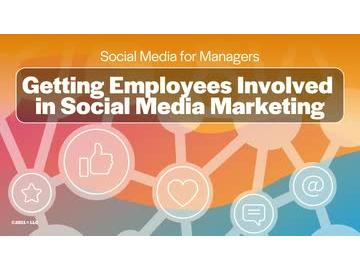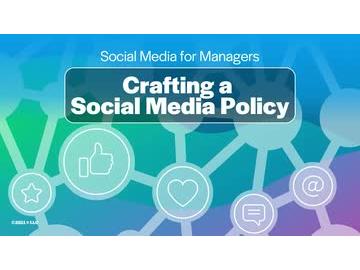Filter by
Sort
Sub-category
Training Bundles
- Artificial Intelligence
- California HR Essentials
- Cybersecurity Essentials
- Digital Transformation
- Diversity, Equity & Inclusion
- DOT/CDL
- Drug and Alcohol Compliance
- Financial Compliance
- First Aid
- Food Safety
- HIPAA Compliance
- HR Essentials
- Leadership
- Mental Health & Wellbeing
- OSHA / Construction Safety
- Personal Development
- Project Management
- Retail
- Workplace Harassment
- Workplace Safety
State
Language
Tags
Price
Duration
Audience
Online Professional Development Marketing Courses
Courses

Professional Development
Marketing Essentials for Event Planners

Professional Development
Legal Social Media at Work Course

Professional Development
Social Media for Managers: Engaging With Employees on Social Media

Professional Development
Social Media for Managers: Getting Employees Involved in Social Media Marketing

Professional Development
Social Media for Managers: Crafting a Social Media Policy

Professional Development
Social Media for Managers: Using Social Media for Talent Recruitment

Professional Development
Social Media for Managers: Using Social Media for Hiring

Professional Development
Social Media for Employees: What Are My Rights?

Professional Development
Social Media for Employees: Navigating Conflict on Social Media

Professional Development
Social Media for Employees: Social Media Privacy Settings

Professional Development
Social Media for Employees: Getting a Job: Your Social Media Presence

Professional Development
Social Media for Employees: Using Social Media to Enhance Your Career

Professional Development
Using Social Media Responsibly Course

Professional Development
Request For Proposal: Master The RFP Procurement Process And Win More Proposals Course

Professional Development
Social Media for Employees: Using Social Media at Work

Professional Development
Social Media for Employees: Top 10 Social Media Etiquette Tips

Professional Development
Digital Marketing: 01. What is Digital Marketing?

Professional Development
Remote Working Masterclass: Running Virtual Events

Professional Development
The Complete Guide to Communications Planning Course

Professional Development
Hit the Headlines with your Media Release Course
About Marketing Training
A while back, I sat down with a marketing coordinator who had just stepped into her first leadership role. Bright, ambitious, full of ideas. But she leaned in and admitted something: “Most days, I feel like I’m just throwing things out there and hoping they work.” That line stuck with me. She wasn’t unmotivated. She was staying up late reading blogs, watching tutorials, scribbling notes—but still second-guessing everything. And honestly? That’s common. Marketing today moves so quickly that even talented people feel like they’re always behind.
That’s where marketing training changes the game. It gives you a structure. It pulls you out of guesswork and shows you what to do, why it matters, and how to know if it’s working.
Understanding the Core Issues in Marketing Training
Here’s the reality: most people already engage in some form of marketing. A social post here, an email there, maybe an ad campaign when there’s a budget. But without training, it’s like building a house with random pieces of wood and hoping it stands. There’s no blueprint.
I’ve seen companies spend thousands on ads without knowing how to target properly. I’ve also seen entrepreneurs waste months “trying everything” without realizing their messaging never spoke to the right customer. Training solves this. It ties the pieces together—SEO, social, ads, content, analytics—so they actually work as a system instead of a bunch of disconnected efforts.
Legal and Industry Framework
People often think marketing is all creativity—fun ideas, eye-catching designs, clever headlines. Sure, that’s part of it. But there’s another side nobody likes to talk about: rules. Data privacy laws like GDPR and CCPA. FTC guidelines on what you can and can’t claim in ads. Accessibility standards for digital content.
I once worked with a startup that almost got fined because they were collecting emails without proper permissions. Not out of malice—just out of not knowing. That’s the type of mistake training prevents. It gives marketers the knowledge to stay creative while protecting their brand’s reputation.
Employer and Organization Responsibilities
When companies don’t provide training, the cracks show fast. Teams make different choices, campaigns overlap, and results feel scattered. Leaders get frustrated, employees feel unsupported, and the cycle repeats.
But I’ve seen the opposite too. A company invests in training, and suddenly the team shares a common language. They plan together instead of separately. Results improve because everyone’s pulling in the same direction. And beyond the numbers, employees notice. Training tells them, “We care about your growth.” That kind of message builds loyalty in ways money alone doesn’t.
Employee and Individual Responsibilities
Of course, training only matters if you use it. I’ve met plenty of people who attend workshops, take notes, then never apply a single thing. Nothing changes.
The marketers who really grow are the ones who roll up their sleeves after training. They test, they adjust, they experiment. They don’t just sit on new knowledge—they apply it. One marketing manager I worked with told me she’d made it a habit: after every training session, she’d pick one strategy to try that week. By the end of the quarter, her team’s numbers looked completely different.
Case Studies and Scenarios
Let me give you two quick stories.
First, a small online shop. They were bleeding money on Facebook ads. They had the passion, but no structure. After completing training, they learned how to narrow down audiences and test creative. Within three months, sales had doubled. Same product. Same budget. Just smarter marketing.
Now the other side. A mid-sized company kept skipping training because they “didn’t have time.” They stuck to the same playbook year after year while competitors evolved. Slowly, their numbers dropped. Eventually, they had to invest way more just to catch up. It wasn’t a lack of talent—it was a lack of knowledge.
Preventive Measures and Best Practices
Training doesn’t just teach new tricks; it helps you avoid old mistakes. Posting without a plan. Ignoring analytics. Following outdated “hacks” from five years ago. Those are traps that cost businesses money every day.
The best training I’ve seen focuses on things like building customer personas, mapping the buyer’s journey, and running controlled tests before scaling. It’s not theory for theory’s sake—it’s practical. And when it’s interactive—role-play, case studies, hands-on projects—it sticks. People walk away not just understanding but ready to use what they’ve learned.
Compliance, Certification, and ROI
Some people roll their eyes at certifications, but here’s the truth: they matter. A Google Ads or HubSpot certification doesn’t just sit on a resume—it signals to employers and clients, “I’ve put in the work. I know the tools. I’m current.”
For businesses, certifications reduce risk. They know their people are trained to handle platforms and campaigns responsibly. And from a financial angle, training often pays for itself. Better ROI on campaigns, more qualified leads, stronger engagement. For employees, it often leads to promotions, raises, or new opportunities.
Conclusion
Marketing training isn’t about cramming jargon or memorizing slides. It’s about finding clarity in a noisy, fast-moving industry. It’s about finally replacing that constant “am I doing this right?” with confidence.
For professionals, it means career growth and recognition. For business owners, it means stretching every marketing dollar further. And for teams, it means working together instead of spinning in different directions.
The pace of marketing isn’t slowing down anytime soon. Training doesn’t stop the changes—but it gives you the tools to handle them without burning out.
Marketing FAQs
Why is marketing training important for businesses?
Marketing training is important because it saves both money and time. Without it, teams rely on trial and error, leading to inconsistent campaigns and slower results. Structured training provides proven strategies, clearer execution, and more confidence across the team.
How often should marketing training be updated?
Marketing training should be updated at least once a year, though quarterly updates are even better in fast-changing industries. With marketing trends and tools shifting constantly—especially in digital spaces—regular refreshers help teams stay relevant and competitive.
Are online marketing training programs as effective as in-person?
Online marketing training can be just as effective as in-person sessions when designed with interaction in mind. Programs that use real examples, interactive tools, and recordings allow learners to study at their own pace. Blending online modules with live coaching often delivers the best results.
What happens if marketing training is ignored or not applied?
If marketing training is ignored, the result is wasted budgets and weaker outcomes. Teams stick with outdated practices, competitors pull ahead, and employees lose confidence. Over time, the cost of neglecting training is usually far greater than the investment required to provide it.
How can organizations measure the effectiveness of marketing training?
Organizations can measure marketing training effectiveness by reviewing both performance numbers and employee feedback. Improved ROI, higher lead generation, and stronger engagement show results on paper. At the same time, employees who feel more capable and confident prove the training is working in practice.




